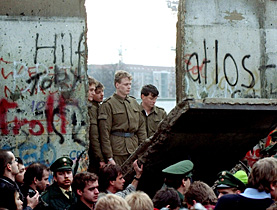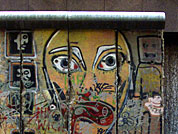Swiss remember “fascinating chaos” of Berlin

It is 20 years since the fall of the Berlin Wall, an event that signalled the end of the Cold War and communist domination of Eastern Europe.
swissinfo.ch caught up with two Swiss citizens who were in the German capital on November 9, 1989, the night when East Germans linked up with their Western neighbours.
Markus Eglin and Esther Wildi-Lieberherr had both settled in West Berlin a number of years before the Wall came down. Eglin was an administrator for the Allied Command, while Wildi-Lieberherr worked in a dental laboratory.
She witnessed the historical events from the Kurfürstendamm, Berlin’s main thoroughfare. “Somebody handed me a bouquet of roses and told me to hand them out to welcome the Ossis [East Germans] coming through,” she said.
A long line of Trabants [East German cars] was trundling along, horns blaring, and Wildi-Lieberherr handed each driver a flower.
The sudden turn of political events caught Eglin, like many Berliners, by surprise. “There had been rumours that travel restrictions would be reduced for East Germans, but I never thought it would happen so fast.”
The historical change sank in the next day. “The city had ground to a halt, overrun by smelly, noisy Trabants,” he said.
“They had come via the Schönenfeld border crossing and they all wanted to reach the Kurfürstendamm. For the next few days Berlin felt strange – there was a sort of fascinating chaos.”
Tourist attraction
For the two Swiss, the Wall had been part of the landscape, even a tourist attraction.
“It belonged to the city, just like the Kurfürstendamm and the zoo,” Wildi-Lieberherr explained. “When friends visited from Switzerland, we always went to look at Potsdamer Platz.”
For Eglin, who lived for several years in the Kreuzberg neighbourhood near the Wall, it was just something that was there.
“I never thought about the Wall on a daily basis,” he said. “Two or three times a week, you would hear the sentry alarms go off, but it could have been someone trying to escape or a rabbit caught up in the wires.”
Comfortable
Life was certainly not hard in West Berlin, according to Eglin, who hails from canton Bern.
“In the 1980s it was an island where we had comfortable lives. Visitors from Switzerland were always surprised how big it was, more than 30 kilometres from north to south.”
Both Swiss experienced change after the Wall came down.
“I walked through the Brandenburg gate on New Year’s Eve that year. Around two in the morning, I shared a bottle of sparkling wine with a couple from East Berlin; we’re still friends,” he said.
“The following year I met my wife, who was also from East Berlin. So from that point of view I was a winner.”
Professionally, he was not so lucky. With the end of the Cold War, the Allied Command was shut down, leaving Eglin unemployed for some time. Today, he works part-time, with two years to go until retirement.
Two worlds
Wildi-Lieberherr experienced firsthand how East Germans went from a planned economy to a market one. In 1991 the dental laboratory she worked for set up a subsidiary not far from Berlin with local partners.
When the laboratory began to retrain East German technicians, she saw how they would drop their work to rush off to the shops because they had heard there was a special deal going.
They explained they wanted to avoid waiting in a queue for hours or missing out on a good deal. Only later did they realise that they didn’t have to rush.
“It was two worlds colliding,” she said. “People in the West had to realise how East Germany had conditioned its citizens.”
The subsidiary became a full-time project for Wildi-Lieberherr. The laboratory owner, who was her partner at the time, asked her to look after it, forcing her to delay a trip to Switzerland.
Although the new lab was completed on time, she said she had to supervise everything. “The East Germans construction workers wouldn’t take on any responsibility,” she added.
And that trip to Switzerland? She says she still hasn’t managed to make it.
Paola Carega in Berlin, swissinfo.ch (Adapted from German by Scott Capper)
In the summer of 1989 Hungary decided to open its borders, causing an exodus of thousands of East Germans to West Germany via Hungary.
The political crisis that followed the Hungarian events led to the GDR’s first free elections on March 18, 1990, and to the negotiations between the GDR and West Germany that culminated in a Unification Treaty.
The Berlin Wall was erected by the GDR and completely encircled West Berlin, separating it from East Germany.
The East German government announced on November 9, 1989, after several weeks of civil unrest, that all GDR citizens could visit West Germany and West Berlin.
Over the next few weeks, parts of the wall were chipped away by the public and souvenir hunters; industrial equipment was later used to remove most of the rest of it. The fall of the Berlin Wall paved the way for reunification, which was formally concluded on October 3, 1990.
The united Germany remained a member of the European Community (later the European Union) and of Nato.


In compliance with the JTI standards
More: SWI swissinfo.ch certified by the Journalism Trust Initiative














You can find an overview of ongoing debates with our journalists here . Please join us!
If you want to start a conversation about a topic raised in this article or want to report factual errors, email us at english@swissinfo.ch.